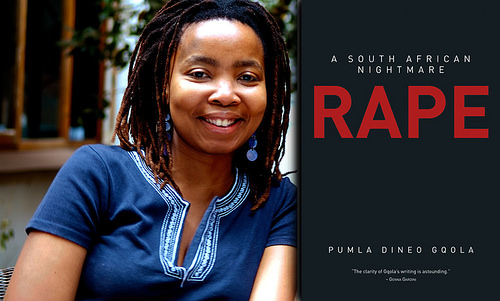
This topic cannot be “overtalkedabout” so that explains why this book by @feminist_rogue, an Alan Paton Award shortlistee would definitely make my to-buy list for July. *staring at account balance and scratches head.lol. Read her interview with Jennifer(BooksLiveSA)
Why this book, and why now?
I wrote the book because rape is endemic in this country and elsewhere, and yet we seem no closer to reversing the tide. This is largely because we have a collective public discourse that is repetitive; so we express the same frustrations, sense of hopelessness and mystification about its causes. The book is an attempt to contribute on how to shift our sense of hopelessness as a country to thinking through how certain patterns of behaviour enable rape culture and a rape crisis.
Has rape always been a problem in South Africa or has the incidence of it increased in recent years?
Rape is not new in South Africa or elsewhere. In South Africa, we have a clearer sense of its high occurrence, but this does not mean that the occurrence of rape is significantly lower in places where survivors report less.
Can you explain the notion of “the female fear factory”?
I coined [the phrase] to explain how women’s fear is manufactured, created, in societies such as ours, with high levels of violence. In the chapter in which I explain it, I show how it is premised on devaluing women, and making us more controllable, and less likely that we’ll stand up for ourselves. I also show what conditions and processes make it a “factory”. The product is fear in women and girls, but also in all vulnerable people, like gender non-conforming people.
What is the source of the “toxic masculinity” prevalent in the country today?
The source of toxic masculinity in South Africa and globally is patriarchal power.
Is our culture complicit in enabling sexual violence?
Yes, it is. It creates the conditions that enable the manufacture of female fear.
Who should read this book?
Everybody who is interested in ending rape culture; everyone who wants to know what individually and collectively we can do to change and to interrupt the female fear factory.
In what way do you think your book “illuminates truthfulness”?
It confronts many of the lies and excuses we keep repeating that help a rape culture to flourish. It forces us to recognise that we can all do better.
Do you believe we can create a future free of rape and violence?
Yes. Sets of behaviour make rape possible and pervasive. Behaviour and consequences for raping can be changed. I believe all oppressive violence can end. History shows we don’t live like we used to in medieval times with the kinds of violence that were normal then, or even 300 years ago. So, yes, I believe a future without rape is possible. But it has to be created.
Culled: BooksLiveSA website

